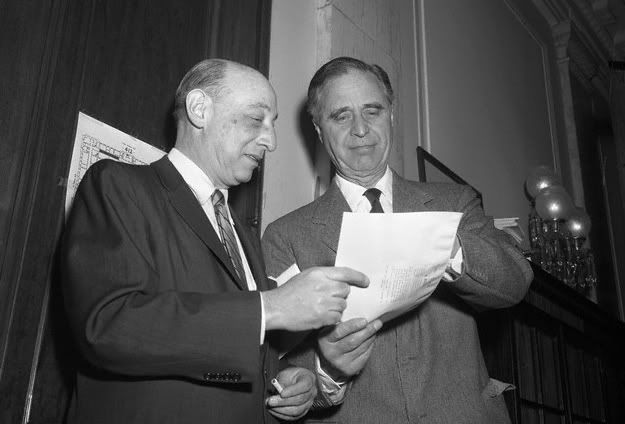Welcome to DU!
The truly grassroots left-of-center political community where regular people, not algorithms, drive the discussions and set the standards.
Join the community:
Create a free account
Support DU (and get rid of ads!):
Become a Star Member
Latest Breaking News
General Discussion
The DU Lounge
All Forums
Issue Forums
Culture Forums
Alliance Forums
Region Forums
Support Forums
Help & Search
General Discussion
Related: Editorials & Other Articles, Issue Forums, Alliance Forums, Region ForumsTotalitarian Paranoia in the Post-Orwellian Surveillance State
http://billmoyers.com/2014/02/11/totalitarian-paranoia-in-the-post-orwellian-surveillance-state/February 11, 2014
by Henry Giroux
The revelations of whistleblowers such as Chelsea Manning, Jeremy Hammond and Edward Snowden about government lawlessness and corporate spying provide a new meaning if not a revitalized urgency and relevance to George Orwell’s dystopian fable 1984. Orwell offered his readers an image of the modern state that had become dystopian — one in which privacy as a civil virtue and a crucial right was no longer valued as a measure of the robust strength of a healthy and thriving democracy. Orwell was clear that the right to privacy had come under egregious assault. But the right to privacy pointed to something more sinister than the violation of individual rights. When ruthlessly transgressed, the issue of privacy became a moral and political principle by which to assess the nature, power and severity of an emerging totalitarian state. As important as Orwell’s warning was in shedding light on the horrors of mid-20th century totalitarianism and the endless regimes of state spying imposed on citizens, the text serves as a brilliant but limited metaphor for mapping the expansive trajectory of global surveillance and authoritarianism now characteristic of the first decades of the new millennium. As Marjorie Cohn has indicated, “Orwell never could have imagined that the National Security Agency (NSA) would amass metadata on billions of our phone calls and 200 million of our text messages every day. Orwell could not have foreseen that our government would read the content of our emails, file transfers and live chats from the social media we use.” [1]
The democratic ideal rooted in the right to privacy under the modernist state in which Orwell lived out his political imagination has been transformed and mutilated, almost beyond recognition. Just as Orwell’s fable has morphed over time into a combination of “realistic novel,” real-life documentary and a form of reality TV, privacy has been altered radically in an age of permanent, ‘nonstop’ global exchange and circulation. So, too, and in the current period of historical amnesia, privacy has been redefined through the material and ideological registers of a neoliberal order in which the right to privacy has succumbed to the seductions of a narcissistic culture and casino capitalism’s unending necessity to turn every relationship into an act of commerce and to make all aspects of daily life visible and subject to data manipulation. [5] In a world devoid of care, compassion and protection, privacy is no longer connected and resuscitated through its connection to public life, the common good or a vulnerability born of the recognition of the frailty of human life. In a world in which the worst excesses of capitalism are unchecked, privacy is nurtured in a zone of historical amnesia, indifferent to its transformation and demise under a “broad set of panoptic practices.” [6] Consequently, culture loses its power as the bearer of public memory in a social order where a consumerist-driven ethic “makes impossible any shared recognition of common interests or goals” and furthers the collective indifference to the growth of the surveillance state. [7]
Surveillance has become a growing feature of daily life. In fact, it is more appropriate to analyze the culture of surveillance, rather than address exclusively the violations committed by the corporate-surveillance state. In this instance, the surveillance and security state is one that not only listens, watches and gathers massive amounts of information through data mining necessary for identifying consumer populations but also acculturates the public into accepting the intrusion of surveillance technologies and privatized commodified values into all aspects of their lives. Personal information is willingly given over to social media and other corporate-based websites and gathered daily as people move from one targeted website to the next across multiple screens and digital apparatuses. As Ariel Dorfman points out, “social media users gladly give up their liberty and privacy, invariably for the most benevolent of platitudes and reasons,” all the while endlessly shopping online and texting. [7A] This collecting of information might be most evident in the video cameras that inhabit every public space from the streets, commercial establishments and workplaces to the schools our children attend as well as in the myriad scanners placed at the entry points of airports, stores, sporting events and the like.
Yet the most important transgression may not only be happening through the unwarranted watching, listening and collecting of information but also in a culture that normalizes surveillance by upping the pleasure quotient and enticements for consumers who use the new digital technologies and social networks to simulate false notions of community and to socialize young people into a culture of security and commodification in which their identities, values and desires are inextricably tied to a culture of private addictions, self-help and commodification.
Yet the most important transgression may not only be happening through the unwarranted watching, listening and collecting of information but also in a culture that normalizes surveillance by upping the pleasure quotient and enticements for consumers who use the new digital technologies and social networks to simulate false notions of community and to socialize young people into a culture of security and commodification in which their identities, values and desires are inextricably tied to a culture of private addictions, self-help and commodification.
..more..
InfoView thread info, including edit history
TrashPut this thread in your Trash Can (My DU » Trash Can)
BookmarkAdd this thread to your Bookmarks (My DU » Bookmarks)
5 replies, 610 views
ShareGet links to this post and/or share on social media
AlertAlert this post for a rule violation
PowersThere are no powers you can use on this post
EditCannot edit other people's posts
ReplyReply to this post
EditCannot edit other people's posts
Rec (5)
ReplyReply to this post
5 replies
 = new reply since forum marked as read
Highlight:
NoneDon't highlight anything
5 newestHighlight 5 most recent replies
= new reply since forum marked as read
Highlight:
NoneDon't highlight anything
5 newestHighlight 5 most recent replies
Totalitarian Paranoia in the Post-Orwellian Surveillance State (Original Post)
G_j
Feb 2014
OP
woo me with science
(32,139 posts)1. K&R
Octafish
(55,745 posts)2. The Secret Government
Those in on the secrets make a killing -- over generations, in the case of the Bush and Rothschild families.

Those in the dark get the shaft -- for generations, in the case of We the People of the United States.
[URL= .html][IMG]
.html][IMG] [/IMG][/URL]
[/IMG][/URL]
Octafish
(55,745 posts)4. Giroux's article is a must-read.
"Nothing will change unless the left and progressives take seriously the subjective underpinnings of oppression in the United States."
The images from the Depression and the one from the Eisenhower years offer a glimpse of where we are heading.
More words for those interested in heading in a better direction:
Via Chris Hedges:
...The goal of wholesale surveillance, as Arendt wrote in “The Origins of Totalitarianism,” is not, in the end, to discover crimes, “but to be on hand when the government decides to arrest a certain category of the population.” And because Americans’ emails, phone conversations, Web searches and geographical movements are recorded and stored in perpetuity in government databases, there will be more than enough “evidence” to seize us should the state deem it necessary. This information waits like a deadly virus inside government vaults to be turned against us. It does not matter how trivial or innocent that information is. In totalitarian states, justice, like truth, is irrelevant.
CONTINUED...
Thank you for another outstanding OP, G_j. The people who tried to overthrow FDR in 1933 had kids. And the family fortunes include a lot of profit from slaveholding and mass murder.
marions ghost
(19,841 posts)5. This looks excellent
but long! Will read, thank you--